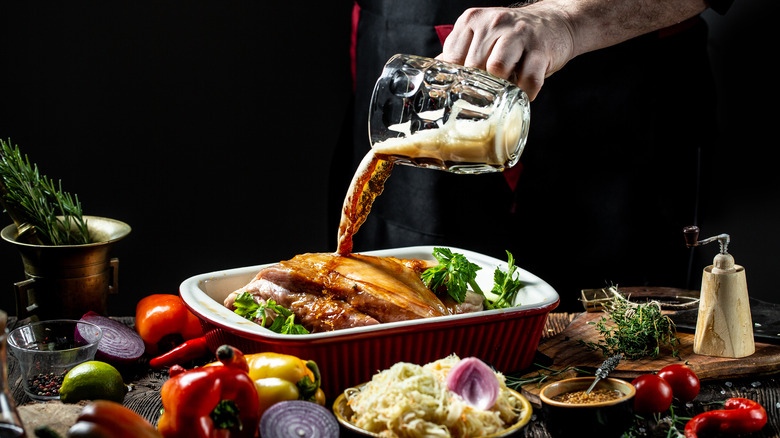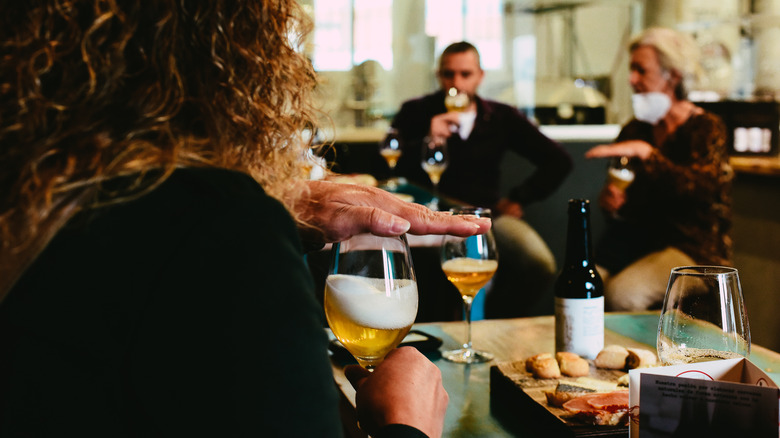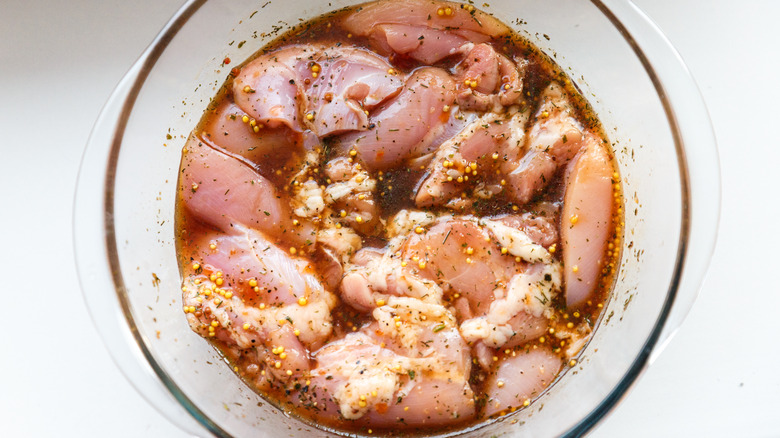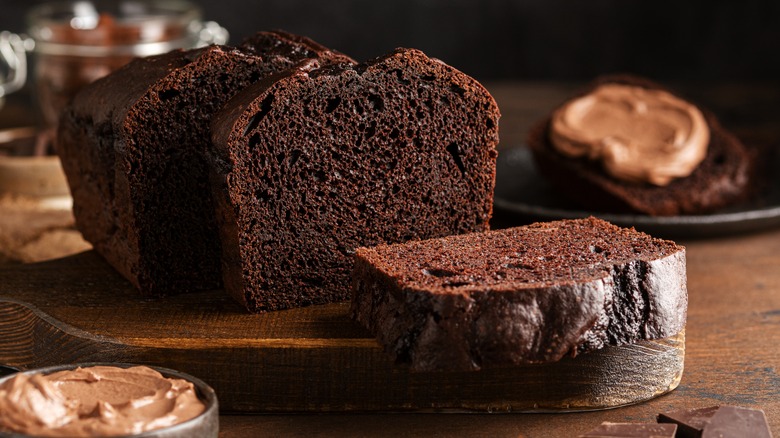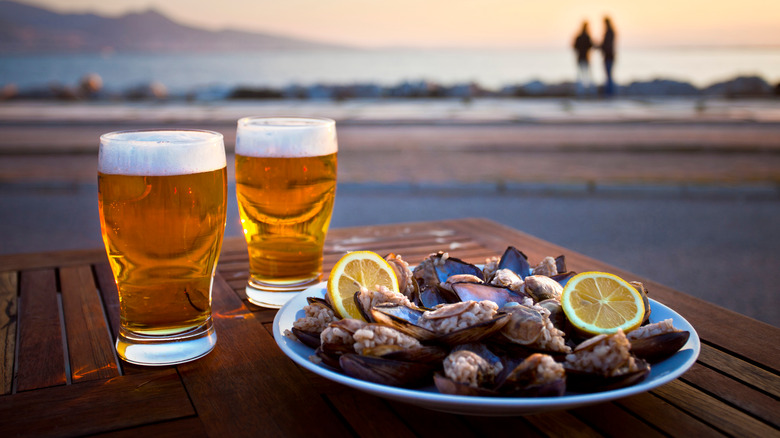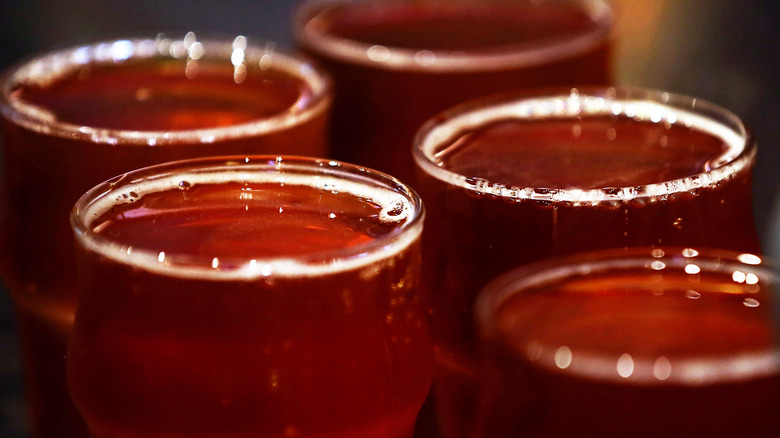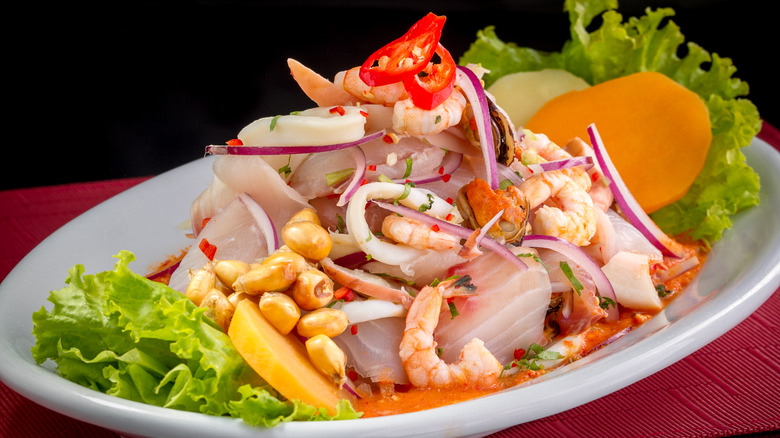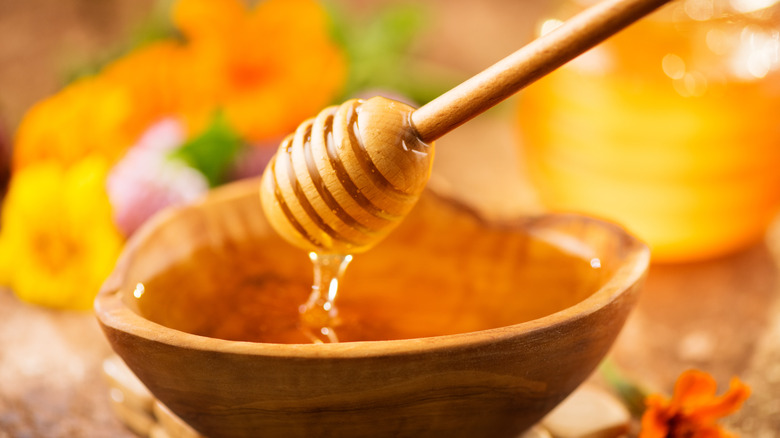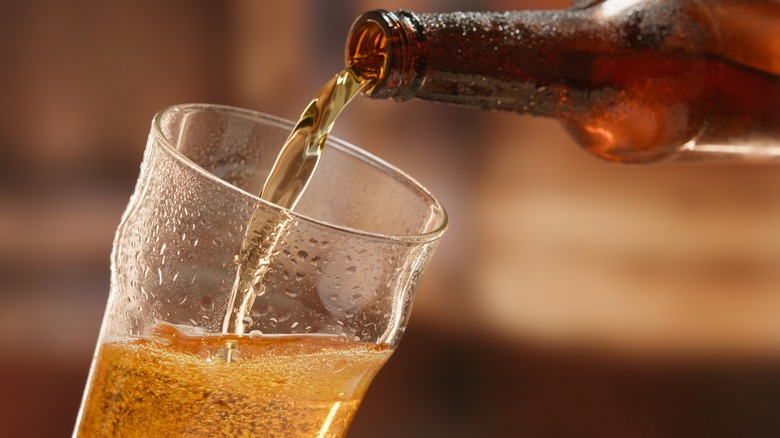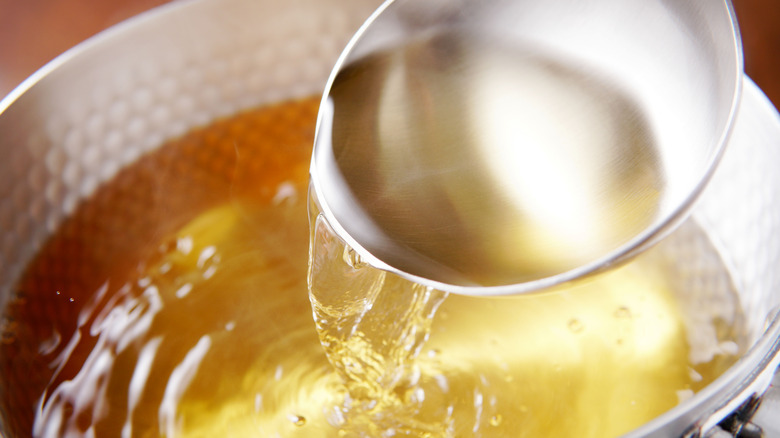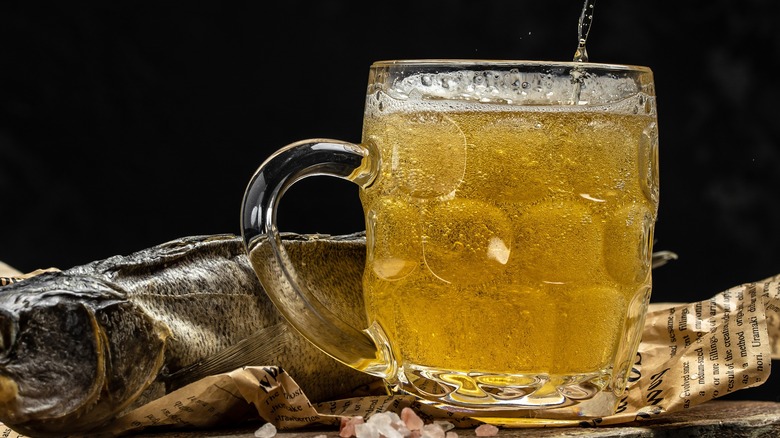12 Essential Tips For Cooking With Beer
Wine may be regarded as the cooking liquid of choice for many home cooks, but if you limit yourself, you won't be able to appreciate all that beer has to offer. Cooking with beer is a tradition that goes far back in history. According to NPR, physicians in ancient Egypt and Sumeria believed that cooking with beer was good for your health. Doctors' orders, right?
But, for many people, cooking with a beer is still a mystery. How exactly should you use this fermented brew, and what should you expect when you do? And what kind of beers should you even reach for, anyway? Well, we spoke with Sean Z. Paxton, executive chef and founder of Home Brew Chef, and it turns out — it's a little complicated. There aren't many easy answers when it comes to cooking with beer, so that's why you have to get into the kitchen (and the brewery, if possible) and experiment for yourself.
Fortunately, for anyone just looking to dip their toes into the cooking-with-beer waters, we've gathered some essential tips for when you crack open a cold one in the kitchen.
Educate yourself about beer
If you want to do anything well, you have to set the foundation. Of course, you should know the basics of cooking before you attempt to cook with beer, but chef Paxton says it also pays to know about beer itself. He said it's a good rule of thumb to "understand the beer" and "understand what you're trying to do." For example, if you want to add a layer of acidity to a dish, it helps to know that lambics have that tartness. Or, it's best to avoid light beers when grilling.
So, how exactly do you go about learning about beer? First, research different styles of beer, and find out how popular beers rank, such as Trader Joe's, for tasting notes. Paxton says you should also head to one of the local breweries in your state. If you can, speak to the bartender: What are some flavor profiles (any special malts with a caramel flavor)? What beers does the brewery make? How much alcohol do they contain?
And try to talk to the brewers. Many enjoy talking about their work, so if they have the time, they could be willing to share their knowledge. "Not many people think about the beer and what goes into making that beer, and I really wish people would stop and appreciate not only the talent of a chef but the talent of a brewer and how those two combine to make something truly remarkable," Paxton told us.
Taste the beer before you cook with it
The next step for cooking with beer? You'll need to understand which beers have the right tasting notes to complement your cooking. Ultimately, cooking with beer requires a strong intuition. What flavors taste good with each other? If you're new to cooking, and you don't know what you like yet, feel free to consult the experts. Many recipes will spell out which brew to include, such as adding stout to a Irish beer bread recipe or beer-battered onion rings with crisp lager.
But, if you more of an advanced home cook and already have a sense of the flavor profile, Paxton says you should think about what you want to add to a dish when you plan on cooking with beer. Make sure that the beer you choose has those qualities: perhaps, a Mexican lager like Negro Modelo with caramel to complement steak and carnitas.
If you're at the beer shop and you're trying to figure out how to pick and taste beer to cook with, you can always ask the staff for help in choosing a beer with the flavor profile you're after. But still, before you start cooking, take a little sip to see what it tastes like — this will help you decide what other ingredients you may want to pair with the beer.
Add beer to upgrade meat marinades
One easy way to cook with beer is to tenderize meat with a boozy marinade. The beer can help break down the meat, so it's nice and tender when you're ready to cook it. Of course, there is no one kind of beer that makes a perfect marinade for every type of meat, so think about what you're pairing together and why. Paxton says that a great marinade for steak includes stout, porter, or pale ale. Pork can be marinated with many of the same types of beer, but Paxton noted that because the white meat is sweeter than beef, it can handle a bit more bitterness.
If you want to take your turkey to the next level, consider brining it in a beer such as a lager, which will work exceptionally well here. And if you're marinating fish, you'll want to stick with lower-hopped beers in most cases (with one or two notable exceptions). Paxton suggested the sour beer berliner weisse because it has a lovely tartness that complements seafood well.
Use higher ABV beers for more flavor
The alcohol by volume, or ABV, of beer can vary significantly from one bottle to the next. Some low-alcohol beers contain as little as 0.5% alcohol, while others can be as strong — or even stronger — than wine. As such, it's important to pay attention to the ABV when you're choosing what kinds of beer to cook with.
Paxton told us higher ABV beers, such as some stouts and barley wines, will impart more flavor than their lighter, less alcoholic counterparts like a pilsner. You may want to use beers like a Ukrainian imperial stout if you're trying to add a lot of flavor to your dishes, such as corned beef with stout mustard.
We thought that one of Paxton's suggestions sounded amazing: "If you take [an imperial stout], and you use that in place of milk in a chocolate cake, the results will be incredible." You can use your mom's standard chocolate cake recipe, or even just use a box cake mix, and swap out the milk or water for a stout. It will impart notes of chocolate, vanilla, espresso, and coffee, making each bite taste even richer than normal.
Don't pair beer with dishes that include corn
A specific guideline we weren't expecting involves pairing beer with a common ingredient — as in, don't do it. That ingredient is corn, and you may want to think twice about including beer in any such recipe. According to Paxton, "There are certain flavors that are actually flaws that are in beer, like what they call DMS, or dimethyl sulfide, which is sometimes referred to as a creamed corn or cooked cabbage flavor. Using corn, like in a corn chowder, and adding beer to it will actually accentuate that flaw."
That being said, that doesn't mean that everyone will pick up on this flaw or even find it undesirable. But Paxton said, "It adds an element of risk." Just keep that in the back of your mind the next time you decide to make corn polenta recipe or a vegan corn chowder recipe — you may want to leave the beer for your next meal.
Skip heavily flavored beer when cooking seafood
Cooking with beer is especially fun when you're working with seafood, but, you'll want to be careful with which beer you're picking out. Who doesn't love beer-steamed mussels? Beer can be used in a variety of other fish dishes — just think of a beer-battered fish taco recipe. Generally, you're going to want to look for a lighter-flavored beer if you're cooking with seafood.
Not all complex beers need to be avoided, of course, but Paxton told us that when it comes to beers like imperial stouts, barley wines, and smoked porters, "those flavors will to too overbearing for most seafood." Instead, you might want to try something like a lager, which generally doesn't have too intense of a flavor. Be wary of additions like coffee, fruit, or chocolate, as well — if you're not careful, you might end up with a lot of clashing flavors.
Think twice about cooking with an IPA
IPAs are some of the most popular — and the most polarizing — beers on the market. They have exploded in popularity over the last several years; however, IPAs can be quite hoppy, which means that some people hate this beer as much as others love them. If you are an IPA lover with cans sitting around in your fridge, according to Paxton IPA might not always be the best idea.
While the chef and brewer doesn't have too many hard-and-fast rules for cooking with beer, he did tell us that he uses caution with IPA, or stays away, in most cases. It all comes down to the bitterness factor. IPA is already quite bitter on its own, but when you cook with it, those qualities could be enhanced. "By cooking the beer, you are reducing it, which changes that ratio of sweet to bitter, and it's just going to make it more and more bitter," Paxton said.
Think about the dish that you're getting ready to make: How would it taste if it had a distinct bitterness to it? If that doesn't sound pleasant, then you may want to find a different kind of beer to add to the dish in question, such as a beer brand for people who "don't like" beer.
Making ceviche with beer breaks the IPA rules
While Paxton said that he doesn't often enjoy cooking with IPAs, he said that sometimes, you don't technically have to "cook" with beer — you can find ways to add it to dishes that don't require any heat. One mouthwatering example he gave was a spin on a classic ceviche, where acidic citrus "cooks" the meat: "First take your fish, like a really fresh sashimi-grade halibut or a white fish, and you slice it, you season it a little bit with salt, and then cook it in either lime juice, tangerine juice, grapefruit juice, orange juice, blood orange juice — all depending on the beer that you want to pair it with."
Once you've determined the flavor profile, he explained, "You can adjust the acid or the citrus juice ... and then, after about an hour when the fish is just starting to change color, remove the acid ... and then pour in your IPA."
Who would have thought that an IPA could complement ceviche so well? But on that note, Paxton mentioned that IPA and salmon, when combined, can produce a metallic taste that many find unpleasant, so don't go totally off the rails with your ceviche.
If your food comes out too bitter, fix it with something sweet
People who don't like drinking beer often complain that the drink is too bitter. Of course, some love that bitter flavor and specifically search for beers that feature more of it. But, aggressively hopped beer can be pretty off-putting. And of course, overwhelming bitterness is the last thing you want when you're cooking. So, what do you do if you taste test your dish and you discover that you've accidentally added too much bitter beer?
Paxton told us that it's all about balance. Adding something sweet to a bitter dish will cut some of that bite. As such, you have plenty of options to choose from. Honey is a great option if you have some on hand, and you could also use date syrup or coconut syrup for a slightly different flavor. Don't have any syrup on hand? Raw sugar, unrefined sugar, or brown sugar will also do the trick.
Before you add any sweeteners to your dish, though, just think about the other flavors at play. Pick a sweetener with complementary flavors to what you're cooking, and you'll find that bitterness will be fixed in no time.
Don't cook with beer if you're sensitive to alcohol
Some will tell you that you don't have to worry about cooking with beer because the heat will cause all the alcohol to evaporate anyway. And that is partially true: "The longer you cook something with alcohol, the more of that alcohol will evaporate," Paxton told us. And because alcohol evaporates before water even reaches its boiling temperature, there's a good chance a lot of that alcohol will be cooked off.
But every beer is different, and there's no easy way to tell if all the alcohol has been burned off in the cooking process or not. The alcohol in a higher-alcohol by volume beer, for example, will take longer to evaporate. Therefore, according to Paxton, if you are a person who's sensitive to alcohol, you probably should skip cooking with beer. The chef warns that it's just too difficult to tell whether there will be any alcohol left in your dish. This is especially important for people cooking for kids or anyone with alcohol sensitivities — it's better to leave it out if you have any doubts.
Use alternatives if you don't have beer on hand
Wondering what you should do if a recipe calls for beer and you don't want to use it (or just don't have any on hand)? Luckily, there are a ton of different ways you can replace beer in a recipe that calls for it. Paxton told us that if a recipe tells you to use a coffee beer, a stout, or a porter, you can replace the beer with coffee instead. Similarly, a recipe that calls for a chocolate-infused beer, you can always use chocolate milk instead.
For more savory dishes, pilsner and pale ales can be replaced with chicken, fish, or veggie stock. Dashi broth also works if you have any of that on hand. And a recipe that calls for a sour ale or a lambic can often handle vinegar in its place. Paxton especially enjoys malt vinegar, even though he noted that it's not gluten free.
And for baked goods that call for beer, you can try using spirits like rum, whiskey, and vodka instead. If you're alcohol-free, try a nonalcoholic spirit.
Don't get stuck on rigid rules
While these tips can be helpful, Paxton urged us not to get too stuck on rigid rules while learning how to cook with beer. It's all about educating ourselves and learning what works well together. "It's not like there's this generic 'this goes with this,'" he said. "It's interesting not just to have one beer but to try two, three, five beers with a dish and see what flavors are brought out." So, don't limit yourself.
It may sound cliché, but perhaps the best cooking tip we got from Paxton was to simply have fun in the kitchen when working with beer. After all, it's a chance to learn how to harness a familiar ingredient in a whole new way, and that should be exciting. Don't worry if you mess up — it happens to everyone when they start experimenting in the kitchen. And while you probably don't want to randomly throw-in some alcohol to a multi-step beer-soaked tiramisu recipe right before you host a big party, attempting to cook with fermented brew on a random weeknight can be a great way to spice up an otherwise average dinner.
Paxton feels like it's all about growing your knowledge, and there's a lot of joy to be had in that process. "It's experimentation — you're supposed to have fun."
